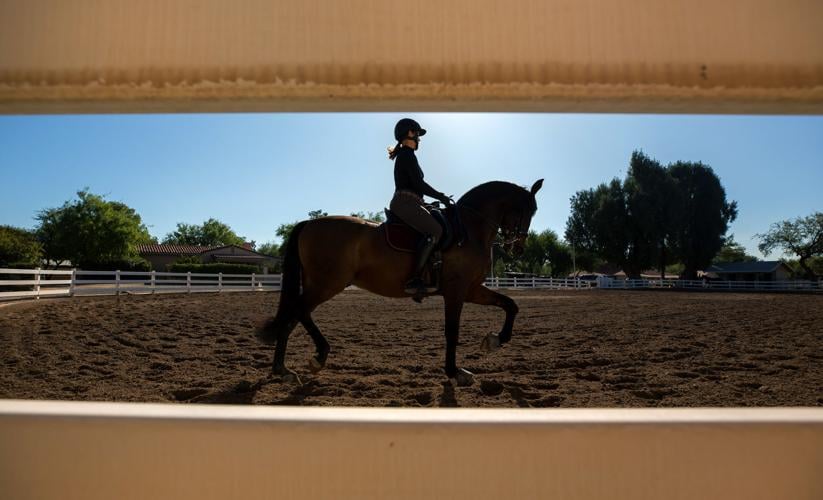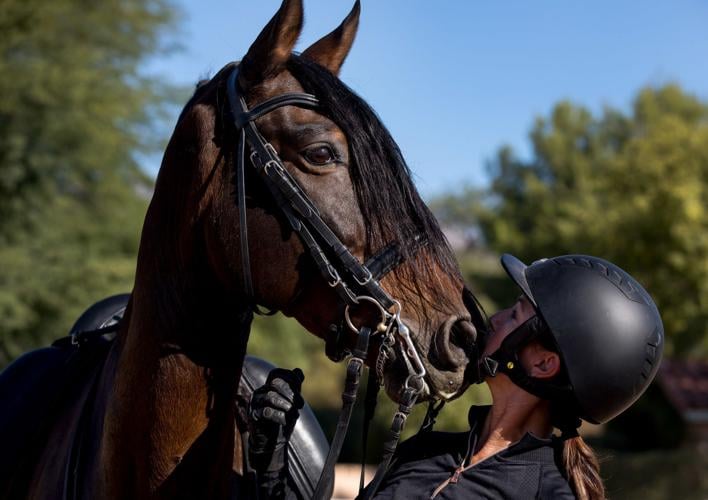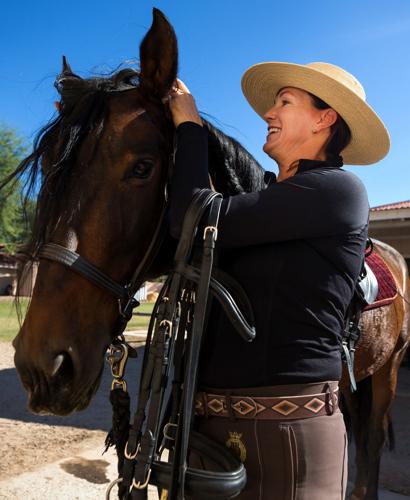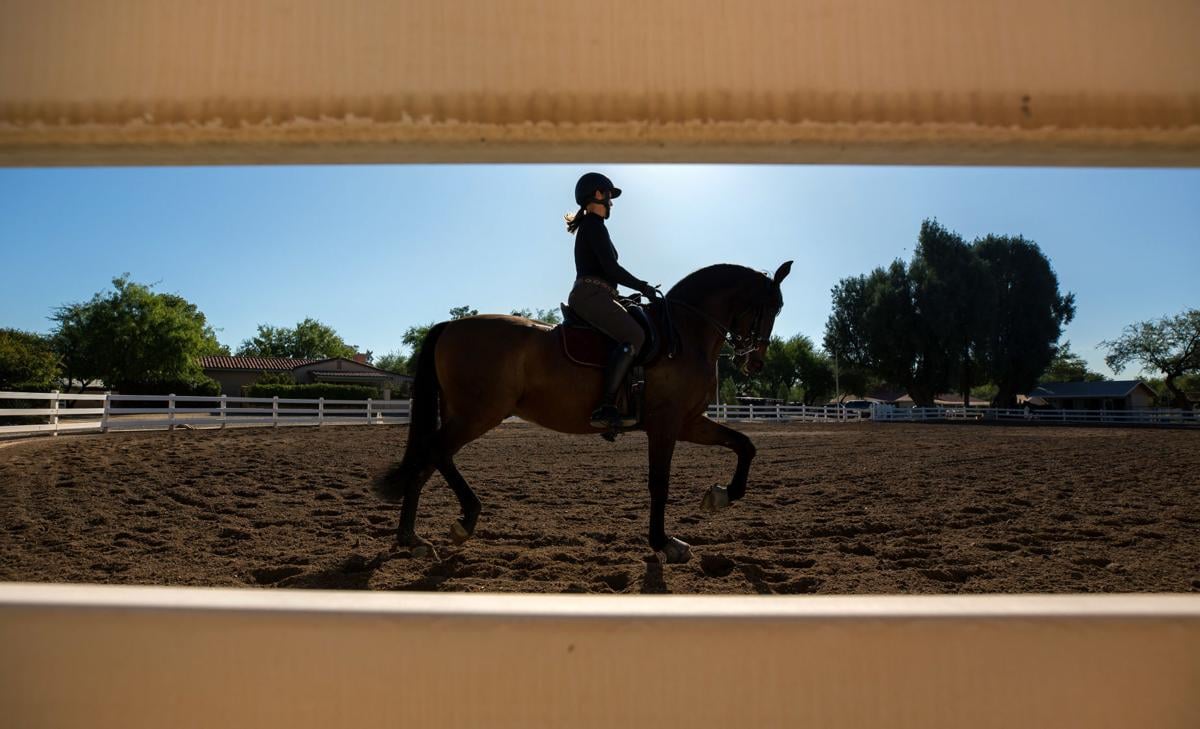Anyone involved with equestrian sports knows that a horse’s genetics play a large role in its traits, and some competitors pay top dollar for horses with championship bloodlines.
The genetic component may count for the people who ride them, too. Some claim they were born to ride or that they “inherited the horse gene.”
Like Tucsonan Jennifer Parker. The 48-year-old rode her first horse before most of her peers knew how to ride a bike.
She now runs Agape Dressage out of Willow Woods Stable, a 5-acre boarding facility off Sabino Canyon Road. Before that, Parker either traveled to her clients or they came to her, but in Agape’s 28-year-run, it has never had a brick-and-mortar location and has never needed one to thrive.
Parker rides and trains horses — and their owners — to compete in dressage competitions at a national level and has worked with riders of all ages. Competitions have taken her to New Mexico, Texas, Colorado and as far away as Kentucky, where she had a student qualify for the national championships in dressage.
And when competitive dressage was sidelined for much of 2020 due to the COVID-19 pandemic, Parker and her students honed their skills and leveled up for next year.
‘It has to all happen at the right moment’
Dressage is an Olympic sport that got its name from the French term for “training.” The purpose of the sport is to show a strong, supple horse while the rider maintains a calm and attentive demeanor, per the United States Dressage Federation. Competitive dressage consists of progressively difficult levels, each of which contain multiple tests that judge a rider and horse based on a series of movements.
It’s detailed and technical, and is often compared to figure skating or ballet. And when done properly, it can look like a dance.
“When it’s done well, there’s this beauty and harmony between the horse and rider. It looks effortless, even though I know the horse and rider are working so hard,” Parker said. “Any equestrian discipline is hard, because the rider has to be an athlete, but the horse is an athlete. It has to all happen at the right moment.”
Parker started riding when she was 3 years old, taking lessons at Old Adobe Riding School on River Road. By 5, she was ready for something a little more advanced.
“At one point, the instructor told everyone to halt and my horse stopped. We were right in front of where the parents were sitting,” Parker said. “My mom said, ‘I think perhaps I should take Jennifer home. She’s asleep.’ And I was asleep on the horse, just as comfortable as can be.
When Parker was 4, her parents divorced and her mother, Ann Alden, purchased Esperanza Riding Stables.
“It became a big boarding stable with like 65 horses. She brought in trainers for dressage, western and jumping,” Parker said.
Alden spent her life helping people overcome mental, physical and emotional challenges through equine assisted therapy, focusing much of her work on veterans.
When Parker was a little older, Alden and two other moms formed Diamondback Pony Club, and Parker spent the next several years enjoying it with her friends.
“I always loved it. I’m a barn rat,” Parker said.
She continued her lessons, spending summers in California with her horse and participating in live-in programs. She participated in clinics where she trained with top-notch professionals and shined in competition.
In high school, Parker — saying she was “miserable” — decided to take a year off.
“My mom was great. She didn’t force it, she just said, ‘OK, fine.’ And then I came back to it on my own and I never looked back.”
Parker found time to ride and train between classes at honors college at the University of Arizona, where she majored in special education and rehabilitation. The idea was to combine her major with horses and someday become a therapeutic riding instructor, like her mother.
Parker had been volunteering at Therapeutic Riding of Tucson since she was 14. She wrote her honors thesis on the effects of therapeutic horseback riding on ADHD, making it the first study of its kind to demonstrate statistically significant results for kids who rode horses versus those in the control group.
While she was at the UA, word of her extracurricular activities spread. Her classmates and colleagues became her clients.
“Instead of having a normal college job, I trained horses. And by the time I graduated with my degree, I had a barn full of horses to ride and I loved it,” Parker said.
Parker formed Agape Dressage as a 20-year-old.
“There are days that I feel like I use my degree, because I also have minors in psychology and sociology, and both come in handy,” she said.
‘It’s really the basis of so many disciplines’
When she first started out, Parker traveled to her clients’ barns and homes. Nearly 30 years later, the roles are reversed, and everyone comes to see her at Willow Woods.
Parker also used to do all the riding, too, training her clients’ horses and riding them in competition. These days, Parker has roughly 17 clients and only rides four or five of the horses. The rest are ridden by their owners.
“I love to see the owners make the progress with the horse, as much if not more so as when I come in and do a really good test at a show,” Parker said. “I have found over the years for it to be more fulfilling for me to see my students have success.”
Two of her young students have competed in the North American Youth Championships in dressage. Two years ago, Parker attended the U.S. Dressage Finals in Lexington, Kentucky, after one of her adult students qualified to compete.
“That was a blast,” Parker said of the trip. “I have a really strong competitive streak. I like to show and I like to do well. I love when someone is struggling with a new concept or a new movement and they get it and you can see just everything fall into place, both mentally and physically.”

“Every piece of the puzzle needs to be put in place at exactly the right time and in the right order for a horse/rider combo to make a team,” Parker says of dressage. “The heartbreak and disappointments are real and happen more often than the glory.”
She also loves the camaraderie at the barn, which has attracted a strong group of well-educated, diverse women that Parker calls her “Agape Tribe.” They get together outside of the barn for a cooking club and to talk about life.
“I’ve never been good at keeping clients as only clients,” Parker said. “They’re all extended family.”
Willow Woods’ owner, Lynn Boice, started out as one of Parker’s clients. Boice found herself drawn to the meticulous sport for a variety of reasons.
“It’s really the basis of so many disciplines,” Boice said, adding that Parker is good about staying current with the changing methodology within dressage and keeping up to date on the latest news and technology.
“It’s been very nice to see how she’s changed as she’s grown and learned more in her approach,” Boice said of Parker. “She always includes the rider and the horse in her lessons, and she’s really good about helping.”
‘Every piece of the puzzle needs to be put in place’
Parker credits much of her success in the field to her husband, Jeff, who works as a neurology surgical area sales manager .
“My husband is a huge supporter of my dressage dreams and goals,” Parker said, adding that he’s an equal partner at home and with their two children, making it possible for her to spend long days at the barn or go out of town for shows.
Both of Parker’s children are active in sports, and have busy schedules between practice and competition. Many horse trainers work 15 hours a day on a regular basis, which was Parker’s schedule before she had kids.
“I spent more time at the barn than I did at home,” she said. “The horse business, while fulfilling, is incredibly difficult.”

Jennifer Parker, equine trainer, smiles while taking off a harness on Serrano, a 10-year-old Andalusian owned by Shelene Taylor (not pictured), at Willow Woods Boarding Stables, 3312 N. Riverbend Cir. E., in Tucson, Ariz. on Nov. 4, 2020. Parker started taken riding lessons when she was three and began training when she was 20-years-old, said Parker.
It’s also expensive, with Parker saying no one gets into dressage for the money. The sport lacks the prize money that comes with other outdoor sports, like rodeo.
Still, the time away from competition has made Parker and the rest of the Agape Tribe anxious to return. Although competition resumed in August, strict COVID-19 protocols have caused many to stay away. Instead, they’re focusing on individual improvement.
“Originally we were thinking in April that Arizona was going to spike and we all stopped riding voluntarily, because we thought if we get hurt and have to go to the hospital, we’re exposing ourselves and we’re also putting more undue burden on the health-care professionals who are already dealing with COVID,” Parker said. “Then we didn’t really have that spike until a little bit later.”
But dressage is a socially distant sport by nature, and it’s been easy for Parker and the rest of Willow Woods’ riders to adapt to new safety protocols. They sanitize their hands often, clean all shared areas and equipment and tack up their horses inside stalls.
Parker doesn’t take her job for granted. Even bad days — she calls them “gratitude days” — give Parker a chance to be grateful she’s not working an office job. She also knows that while science and genetics can help riders get a competitive edge, there’s still a large element of luck in the sport.
Even if a person does get lucky enough to get a once-in-a-lifetime horse and sponsor at the same time, an injury to the horse or rider can take them right back out of the game, Parker said.
“Every piece of the puzzle needs to be put in place at exactly the right time and in the right order for a horse/rider combo to make a team,” Parker said. “The heartbreak and disappointments are real and happen more often than the glory.”







